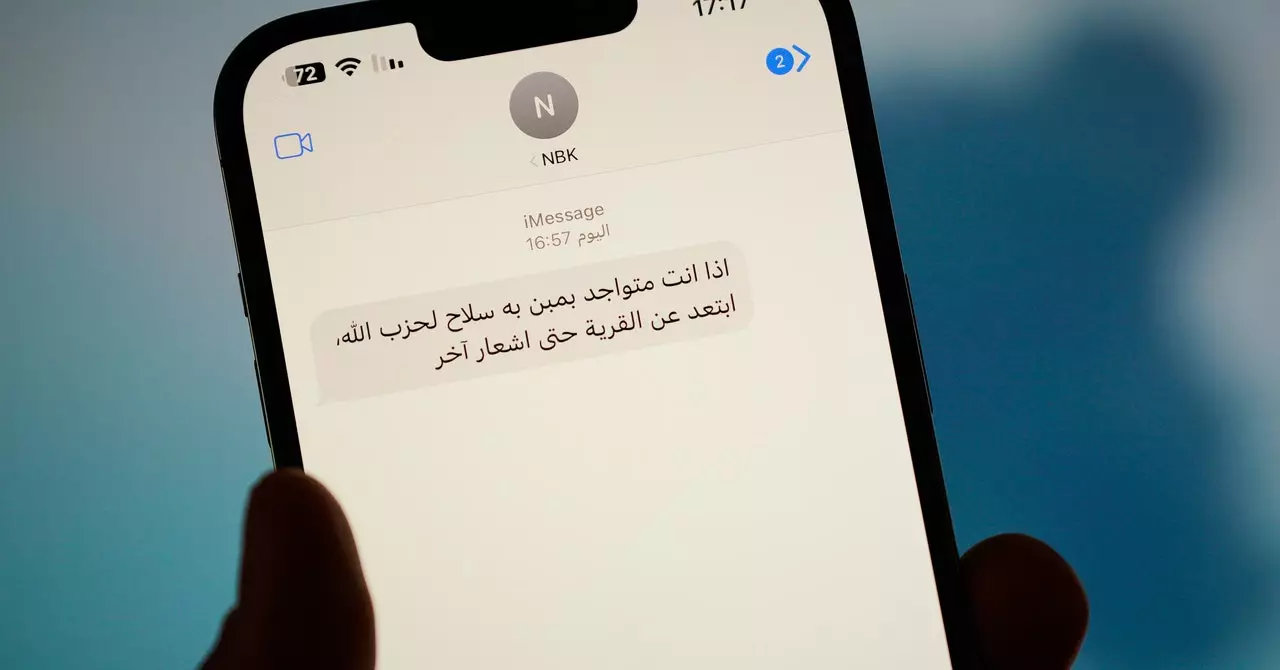In a world increasingly dominated by technology, the methods of conflict have evolved alongside advancements in communication. One chilling manifestation of this evolution is the use of threatening text messages as a psychological tactic in warfare. This trend was starkly illustrated in early September in Beirut, where a simple evening of relaxation for a resident named Nour turned into a moment of terror after receiving a threatening SMS purportedly from the Israeli military. The message, ambiguous yet ominous, read, “We have enough bullets for everyone who needs them,” serving as a stark reminder of the perilous situation in Lebanon amidst rising tensions with Israel.
This isn’t an isolated incident. For many in Lebanon, receiving threatening communications during periods of conflict has become an unfortunate norm. In the early 2000s, citizens often heard terrifying automated calls from the Israeli military, a practice now almost a historical echo of the past. The psychological imprint of such messages, like those Nour received as a teenager during the turbulent year of 2006, contributes to a pervasive sense of fear within the community. Nour’s recollection illustrates how technology dynamically intertwines with historical trauma, making threats feel immediate and personal.
The backdrop to Nour’s experience is critical to understanding the collective psyche of Lebanon. The country has been a battleground of geopolitical conflicts, and the memories of past wars linger on, interwoven into the fabric of daily life. As Israel and the Lebanese militant group Hezbollah continue to exchange fire, the specter of violence looms large, impacting not just physical safety but the mental well-being of citizens.
In this contemporary discourse surrounding warfare, the tools of communication have taken on a dual role: they are both a means of connection and a source of psychological anxiety. As Mohamad Najem, executive director of the Beirut-based digital rights group SMEX, observes, the increase in phone usage among the Lebanese populace during conflicts has correlated with heightened states of insecurity and fear. People are now glued to their devices, often anticipating unwelcome alerts that could escalate their anxiety.
The fact that others have reported receiving similar messages after Nour’s encounter highlights a larger trend of automated psychological operations targeting civilians. The deliberate use of smartphones to send these types of threats underscores a strategy that leverages modern technology to augment the psychological impact of warfare. This is not merely about messaging; it is about instilling fear, creating division, and shifting the dynamics of perceived safety.
Echoes of Historical Trauma
The messages from the Israeli military are reminiscent of past conflicts where propaganda played a key role in shaping public perception and morale. The dual-edged nature of such communications can lead to a cycle of anxiety and aggression—for every text received, there is a tendency to retaliate and reinforce existing hostilities. The specifics of the messages received during crises like the one Nour experienced serve to tap into existing fears and long-standing grievances, adding layers of distress to a population already beleaguered by the scars of war.
As seen in the case of the automated calls instructing inhabitants near Hezbollah weapons to evacuate, such directives echo previous war strategies employed in other regions, showcasing a troubling pattern in which civilian populations are manipulated through fear-based communications. This psychological warfare exacerbates tensions and affects not only personal safety but also community coherence, leaving the societal fabric frayed and susceptible to fear-mongering narratives.
The unsettling reality of threatening messages during conflict signifies a new frontier in the psychology of warfare, where personal devices are weaponized with chilling efficiency. As technology continues to evolve, so too must the discourse around digital rights, mental health, and the ethical implications of using personalized communication as a means of psychological control. Understanding the long-term implications of such tactics is critical for both citizens and policy-makers alike. Ultimately, as conflicts like that in Lebanon continue to unfold and intensify, the importance of fostering dialogue and reforming communication strategies for peace becomes paramount.

